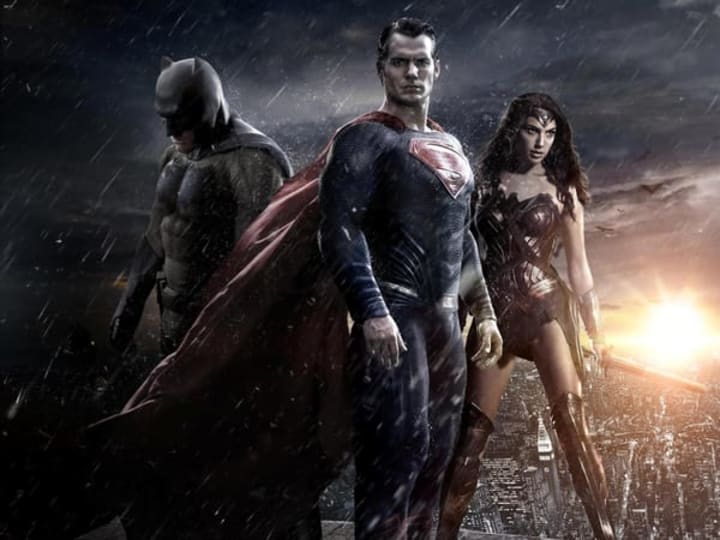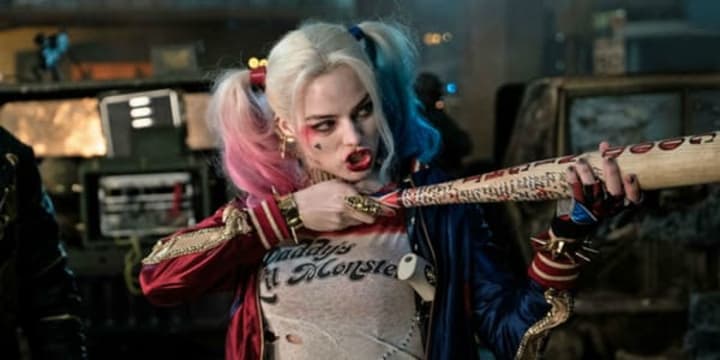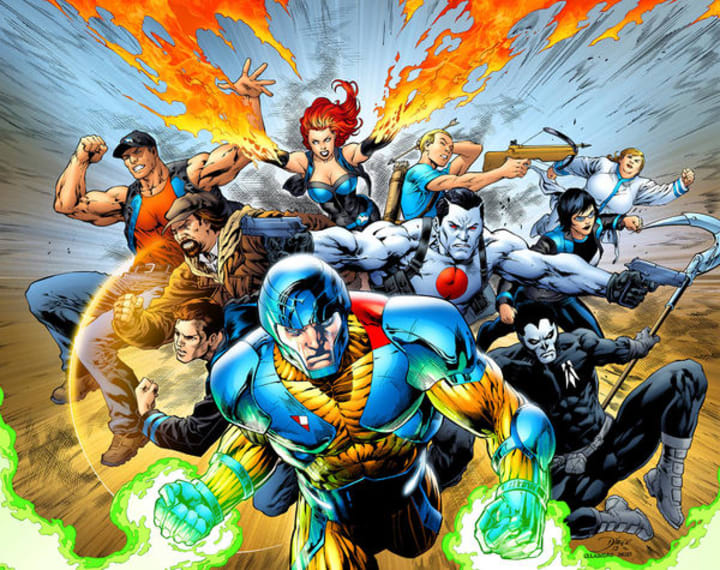
2016 was an exciting year! Marvel Studios has launched their epic Phase Three with a bang, DC's Batman v Superman: Dawn of Justice kicked off a lot of controversy, and we're getting psyched for the latest installment of Fox's X-Men franchise. With not one but four attempts going on to build superhero Cinematic Universes (more on that later), this seems like a good time to ask how it's going...
1. The Marvel Cinematic Universe

Kudos to Marvel Studios; they were first to try their hand at a Cinematic Universe, and their success has led to countless studios and properties trying to emulate them. 2008's Iron Man was a high-risk strategy; tying the superhero franchises together like this risked weakening them all if some of the films didn't perform. The real pressure was on 2012's The Avengers, though; if that film failed to deliver, then the whole MCU project would have collapsed in on itself.
It didn't fail, and the MCU is now entering Phase Three. With Phase Three culminating in the double-film Avengers: Infinity War, we now know Marvel are viewing Phases 1-3 as an ongoing saga that comes to a gripping conclusion. Phase 4 will essentially relaunch the MCU. It's a sensible strategy, because it neutralises the 'escalation' problem that's often plagued the comics; with every superhero uniting against Thanos, the temptation would be to constantly try to find ways to make the next movie "bigger" than the last.

Thanos is the villain of Infinity Wars!
Marvel Studios have built the MCU with a great deal of care. The key idea has been that they've tended to introduce a superhero as a solo franchise, and then weave the superhero into the broader fabric of the MCU. With the concept more firmly established now, though, they've recently begun to switch things up. Anthony Mackie's Falcon made a major cameo in Ant-Man, for example, while Tom Holland's Spider-Man and Chadwick Boseman's Black Panther both made their début in Captain America: Civil War.
One thing that's not changing is that each franchise within the MCU is being encouraged to stand on its own two feet. Stylistically, the slapstick humor of Ant-Man contrasts with the political depth of Captain America: The Winter Soldier; the space opera of Guardians of the Galaxy contrasts with the fantasy-esque approach of Thor: The Dark World. It's a winning strategy, because it allows each franchise to have its own unique style and tone, while fitting into a broader universe. Doctor Strange, due out later this year, looks to capitalise on this a lot, with a tone and style reminiscent of Inception.
Unlike any other Cinematic Universe, the MCU also embraces Marvel Entertainment's live action TV and Netflix series. While this is exciting in that it builds a single complex universe, we're now seeing a certain level of tension begin to build up between Disney's two departments. Chloe Bennett, a.k.a. Quake in Agents of S.H.I.E.L.D., has voiced frustration that the MCU movies never reference the TV series. Fans recently got excited over a rumour Vincent d'Onofrio's Kingpin would cameo in Spider-Man: Homecoming, suggesting that this issue is beginning to be picked up by the fans too. It's likely to come to a head in Marvel Studios' Inhumans movie (postponed, but not cancelled), which deals with a concept already heavily explored in Agents of S.H.I.E.L.D.
DC Extended Universe

DC's Trinity hit the big screen!
The second major entry in the Cinematic Universe is the DCEU, a much newer competitor in this game. 2011's Green Lantern was supposed to be the launchpad for the DCEU, but that film just didn't work out. As Ryan Reynolds, who played the title character, reflected:
"You really need a visionary behind a movie like that, but it was the classic studio story: "We have a poster, but we don't have a script or know what we want; let's start shooting!""
'Visionary' status seems to have been given to controversial director Zack Snyder, whose 2013 Man of Steel finally became the launchpad. DC Film chose to turn the Man of Steel sequel into a cross-franchise epic, Batman v Superman: Dawn of Justice. Unfortunately, Batman v Superman proved to be a controversial film; every decision was criticised on social media, and the final film received mixed fan responses and strongly negative reviews from critics. The movie's reception prompted fans to recognise a massive range of problems on aggregate sites such as Rotten Tomatoes.

BvS was slated on Rotten Tomatoes.
DC Film seems to be working to correct the problems they've noted, with Geoff Johns taking on the 'visionary' role, and hopefully leading the DCEU into a brighter, more hopeful future.
Interestingly enough, DC Film's approach seems to differ dramatically from Marvel Studios'. Where Marvel Studios tend to release a franchise and then weave it into the overarching fabric of the MCU, DC Film appear to be focusing on major movies that feature cameos; the specific superhero franchise is then launched off the back of the first appearance. It's a different approach, and it may well pay off; Gal Gadot's cameo as Wonder Woman in Batman v Superman has massively increased fan expectations for next year's solo film.
This year's Suicide Squad - with a sequel in the works, and Margot Robbie acting as lead on a Harley-Quinn-centric spin-off - seems to be adding a second string to the DCEU's bow. Robbie's Harley Quinn looks to be the breakout character, and where the MCU tends to be centred entirely on the Avengers, the DCEU is opening up multiple avenues for franchise creation. It's an exciting prospect.

Fans are excited to see Margot Robbie's Harley!
All in all, the DCEU has had a rocky start, but has real potential. DC Film's approach is very different to that of Marvel Studios, and that makes me hopeful.
Fox's X-Men Universe

X-Men: Apocalypse is out on international markets!
It's not a surprise that Fox are getting in on the act. Fox purchased the film rights to the X-Men franchise back in the 1990s, when Marvel Comics were struggling to stave off bankruptcy. Since 2000, Fox have released a near-constant stream of films; 2006's X-Men: The Last Stand almost killed off the franchise, but Fox revived it rather than hand it back to Marvel.
Some weaker films - the aforementioned Last Stand and 2009'S X-Men Origins: Wolverine - dramatically weakened the franchise. Last Stand was a particularly awkward one, in that it had literally killed off the majority of the future possible protagonists. Ultimately, Fox chose to take a controversial route; abandoning the 'grounded' universe that Bryan Singer had tried to build, they used 2014's X-Men: Days of Future Past to reboot the universe through time-travel. X-Men: Apocalypse - which I'll be seeing today - promises to continue in this less grounded vein.
Of course, the key point to a Cinematic Universe is that it isn't just a single never-ending franchise. Fox briefly considered using 2015's Fantastic Four to add a cosmic edge to this Cinematic Universe, with the two franchises intended to coexist. Unfortunately that film was rather troubled, although Fox are currently sounding off about doing a sequel. I strongly suspect that they'll keep the sequel out of the more successful X-Men universe, though.
This year's Deadpool was Fox's first real attempt to broaden out the X-Men world, although it's worth noting that the film only got made after someone leaked clips on to the Internet. Deadpool proved that studios could do superhero films in a lot of different ways, and opened up the potential to create films in this universe with a range of tones and styles.
In truth, even though Fox have been producing X-Men movies since 2000, it's only with the release of Deadpool that the franchise has truly begun to turn into a Cinematic Universe. It's going to be interesting to see how this new universe comes together...
Valiant Cinematic Universe

Meet the superheroes of Valiant!
Only hardcore comic book fans have really heard of Valiant, a comics publisher who comprise less than 1% of the market. That said, Valiant's comics are tremendous; their quality frequently exceeds that of the Big Three (Marvel, DC, and Image), and they have a universe of real complexity and beauty. Sony Pictures, having had to make a deal with Marvel Studios in order to recover from their poor handling of the Spider-Man franchise, still wanted an 'in' for the superhero Cinematic Universes. Valiant was their chance.
The studio and the publisher have signed a five-picture deal that will bring characters like Bloodshot and Harbinger to the big screen. Bloodshot is due out in 2017, with Harbinger following on shortly after. The plan is for a sequel to each franchise, before the superheroes come together for a Harbinger Wars epic (inspired by the excellent 2013 comic book event).
The sad truth is that the Valiant Cinematic Universe has issues that the others don't, specifically the fact that it features characters with no name-recognition. That said, readers of Valiant will well be aware of the potential of the comic book universe. What's more, the fact that the arcs aren't so well-known means that they can be fresh and original. Lacking the kind of 10-year plans Marvel Studios are known for can be an advantage, as the studio can react to audience responses, twisting plots and character arcs as required.
So there you have it! Superhero fans can rejoice that we're now in an age of Cinematic Universes, where franchises intertwine into a fascinating range of films. Marvel may have blazed the trail, but the others are making their own bids to enter this larger world. It's an exciting time to be a fan!

So who will triumph?
About the Creator
Tom Bacon
A prolific writer and film fan, Tom has a deep love of the superhero genre.






Comments
There are no comments for this story
Be the first to respond and start the conversation.